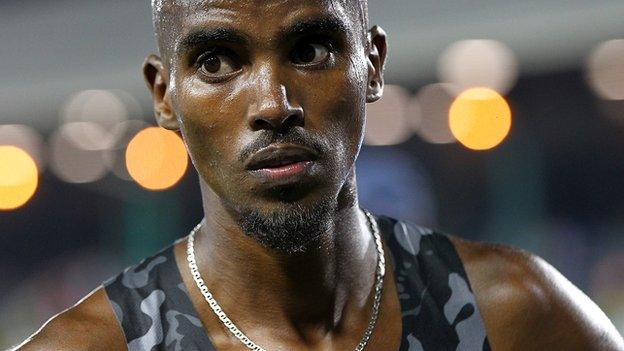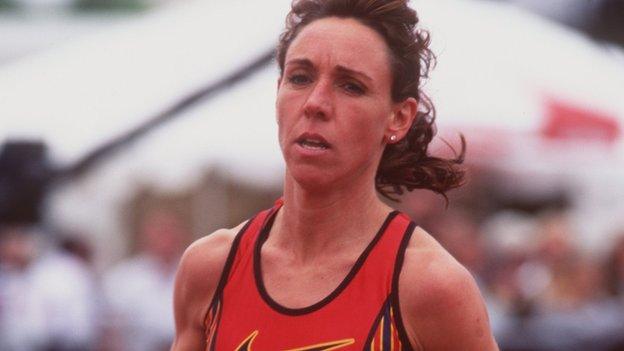Mo Farah 'missed two drugs tests' before London 2012 gold medals
- Published

Double Olympic gold medallist Mo Farah is currently training in France
Great Britain's Mo Farah missed two drugs tests before he went on to become a double gold medallist at the 2012 Olympics, a newspaper has claimed.
According to the Daily Mail,, external Farah's first missed test appears to have been in early 2010, months before he joined Alberto Salazar's Nike Oregon Project.
The Mail says the second one came at Farah's home in February 2011, when he claimed not to have heard the doorbell.
Salazar is accused of doping Galen Rupp in 2002 but denies the claims.
Allegations Salazar practised doping techniques on US runner Rupp were made in a BBC documentary called 'Catch Me If You Can', produced by Panorama and US investigative journalism specialists ProPublica.
Analysis: Dan Roan, BBC sports editor | |
|---|---|
"Anti-doping regulations state athletes must give details of where they will be for one hour every day. But inevitably, on occasions, they're not at home when the testers come calling. We know that in 2011, around the time this story relates to, nine UK athletes missed two tests. But that number can change. In 2014 it was only one, so it's not common but it's not unheard of either. But the ramifications of missing a third test can be very serious." |
Rupp has denied allegations in the programme that he was given the banned anabolic steroid testosterone by Salazar as a 16-year-old.
The documentary made no suggestion that middle distance runner Farah, 32, has been involved in doping.
Farah announced he was joining Salazar in early 2011.
His gold medals in the 5,000m and 10,000m at London 2012 were among the defining moments of the Games.
At the time, UK anti-doping (Ukad) rules stated that an athlete who missed three tests in any 18-month period could face up to a two-year ban.
That meant Farah could have been ruled out of his home Olympics with one more breach of the rules. Nine UK athletes missed two tests in the same year.
Mo Farah angry at 'being dragged through mud'
The rules have since been amended and today athletes who miss three tests in a 12-month period can be banned for four years.
The Mail claims to have had access to legal documents showing Farah and his team appealed to Ukad over his second missed test.
Ukad accepted that "intent and negligence are not the same thing" but, according to the Mail, added it was clearly Farah's "own fault" he had missed the second test.
The Mail claimed further correspondence showed Salazar had warned Farah on 5 May, 2011: "If you miss another test, they will hang you."
A source close to Farah has told the BBC that the athlete has not missed any tests since that second missed test.
Ukad would not comment on the missed drug tests allegations but issued a statement on Thursday that read: "UK Anti-Doping does not disclose personal data relating to an individual's test history.
"Ukad has a dedicated Athlete Support Officer who works with athletes on the National Registered Testing Pool, and with National Governing Bodies of sport to ensure they manage their whereabouts reporting responsibilities."
Who is Alberto Salazar? |
|---|
Age: 56 |
Born: Havana, Cuba (emigrated to US as a child) |
Achievements: Three-time New York Marathon winner (1980, 1981, 1982), Boston Marathon winner (1982), US Outdoor Track & Field 10,000m champion (1981, 1983), US Cross Country Champion (1979), National Distance Runner's Hall of Fame inductee (2000), represented US at 1984 Olympics in Los Angeles |
Farah announced on Wednesday that he will compete at the Monaco Diamond League meeting on 17 July in what will be his first race since doping allegations were made against his coach.
Farah withdrew from a 1500m race in Birmingham on 7 June because he felt "physically and emotionally drained".
After pulling out, Farah returned to the United States to spend time with his family and "seek answers" from Salazar about the doping claims.
- Published16 June 2015
- Published17 June 2015

- Published12 June 2015

- Published10 September 2015
